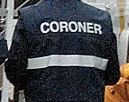A coroner's inquest into the death of a man while in Prince George RCMP custody ended Thursday with a jury calling for establishment of a sobering centre in the city.
The seven person jury found that Jamie Wilford Shanoss, 51, died as a result of acute alcohol poisoning during the early morning of Nov. 21, 2016 and effectively endorsed a suggestion from Prince George RCMP Insp. Shaun Wright.
Testifying on Thursday - he was the last of 18 witnesses to give testimony over the course of the inquest which began Monday - Wright said such centres exist in other communities around the province - he made special note of Surrey - where police can drop off people who are intoxicated but have not committed a criminal offence.
"They can receive proper supervision to return to a point of sobriety where they can depart and care for themselves as opposed to simply being locked essentially with criminals in a police jail," Wright said.
Although able to walk and talk when he was taken into custody, Shanoss was later found unconscious in the detachment's drunk tank and could not be revived. A pathologist determined he had a blood-alcohol level of .38 at the time, nearly five times the legal limit for driving.
Wright said police have the authority under the province's Liquor Control and Licensing Act to take into custody those drunk enough to be a danger to themselves. He said about 20 per cent of the 4,500 or so prisoners housed at the detachment each year are taken in for that reason.
About a half dozen of them spend between 50 and 200 nights a year in cells set aside for public drunkenness. "And of those six, I would wager that at least three of them in the next 10 years will likely die there because of the amount of time they spend there, which truly isn't where they should be," Wright said.
In earlier testimony, the inquest heard Shanoss had shown up at the Ketso Yoh men's shelter late in the night of Nov. 20, 2016 in a good but disruptive mood. After twice being asked to calm down so others in the shelter could sleep, Shanoss went out for a walk shortly before midnight.
By then, RCMP had been alerted and was eventually found sleeping in an entryway at St. Vincent DePaul's soup kitchen a short distance away. Shanoss woke up when an arresting officer spoke to him and he was described as essentially cooperative when taken into custody.
Wright said the majority of those arrested for drunkenness act like Shanoss, who had been described as friendly and a "nice guy" in earlier testimony. He said police usually ask the person if they have friends or family who could take them but unfortunately, there is a significant number of homeless people in Prince George and the only option they have is the detachment cellblock.
Stationing a nurse at the detachment is unrealistic, according to Wright, because the cells can be empty for hours at a time and having a nurse to be on call is too much to ask.
The jury addressed its recommendation for a sobering centre to Northern Health and the First Nations Health Authority. It also called for more training for the guards who patrol the cells at the detachment.
The inquest had heard the guard on duty at the time failed to carry out enough physical checks that night. Wright said changes are being made into the way guards are being trained and should be in place within the next month.
At about 2 a.m., the guard discovered Shanoss was not breathing and he was dragged out into the hallway where CPR was performed on him. Noting there were two other people in the cell, Wright said room was needed to work on Shanoss and dragging him was "by far the quickest" way to get him out.
Wright said carrying out Shanoss would not have been practical in part because of the dead weight an unconscious person presents and because "you do not want to manipulate the body anymore than you have to" in case there is a medical condition.
Wright said that while the checks were not as thorough as they should have been, the response once it was realized Shanoss was in distress was "text book" and exactly as he would have expected.
Unless facing a criminal charge, requiring people like Shanoss to provide a breath sample upon arrest is fraught with complications related to the Charter of Rights and Freedoms, the inquest was told. Even if one was provided voluntarily, Wright said it might not be practical for someone who is severely intoxicated.



